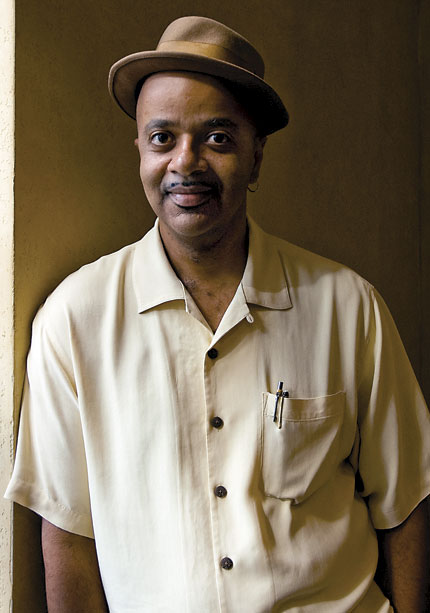fiction
What Came Before
Following an acclaimed memoir and film adaptation, James McBride pens a Harriet Tubman-inspired slave narrative
by Adelle Waldman
For James McBride, an old-fashioned aesthetic is no mere decoration. The vintage typewriter that sits on his desk could well be the one on which Ralph Ellison toiled away in a Harlem basement in the early 1950s, but it’s where McBride works, often after penning a first draft in longhand. The typewriter—like the man himself, who is often dressed in suit, tie, and fedora—may seem anachronistic in the sleek, new office at 20 Cooper Square, where McBride is a distinguished writer in residence at NYU’s Arthur L. Carter Journalism Institute. But a classical elegance is appropriate for a man who keeps turning his eye to the past.
McBride, who is also a professional jazz saxophonist and award-winning composer, first gained literary fame with his best-selling 1996 memoir, The Color of Water (Riverhead). Published in more than 16 languages, it chronicled his childhood in Brooklyn as one of 12 black siblings raised by his white, widowed, Jewish mother. He followed that up with the 2001 novel Miracle at St. Anna (Riverhead), made into last fall’s film by Spike Lee (TSOA ’82, HON ’98). The story, which the author himself adapted as a screenplay, follows a small group of soldiers from the U.S. Army’s all-black division during World War II who are stranded behind enemy lines in a remote Italian village and become objects of fascination to the townspeople. With prose that gains force in large part because of its restraint, the author rarely comments overtly on the potent injustice that underlies his story.
McBride stepped even further into the past for his most recent novel, Song Yet Sung (Riverhead). Released in paperback in January, it tells the story of slaves living on Maryland’s Eastern shore in the 1850s. The haunting and complex portrait teems with a sense of uneasiness as whites, aware of the tenuousness—both morally and pragmatically—of their dominant position, live in fear that their slaves will revolt, or escape to freedom in neighboring Pennsylvania. “How close it all seemed,” one widowed slave owner thinks. “Just eighty miles.” McBride also depicts a society riddled with tensions between not just white and black but also wealthy plantation owners and struggling oystermen, and he captures the lawlessness of life in this remote, swampy, and superstitious region, a peninsula isolated from the rest of the East Coast by the Chesapeake Bay.
It was the place itself that originally attracted McBride. Feeling stuck in his writing, he set off one day from his home in Bucks County, Pennsylvania, to visit Ford’s Theatre, where Lincoln was shot. But on the drive to Washington, D.C., something came over him. “I just went to the left,” he says. “I was trolling for ideas.” He knew that Harriet Tubman was born on the Eastern shore, but when he got there he was struck by the palpable history of the region. “You can smell it, you can feel it when you are down there,” he says. “You learn silence. You learn to listen to the land.”
The story that emerged was loosely inspired by Tubman herself. McBride’s protagonist, Liz Spocott, is a beautiful slave who escapes from the plantation owner who has been raping her since she was a teenager. Liz, like Tubman, suffered a head injury, and it leads her to have prophetic dreams, one of which enables her to free 14 slaves trapped in an attic. Their escape sets off a chain of events that endanger all the blacks in the area, including those vital to the operation of the “gospel train,” as the Underground Railroad is called. What follows is both a suspenseful chase and a meditation on what it means to be a good person in a society riddled with moral contradictions.
McBride says that he is interested in bringing out the humanity in all of his characters, even the ones whose livelihood is derived from chasing down “human chattel.” “The minute you start to judge people as a creative writer, you are dead creatively,” he says. “Judgments are the cork stops of ideas, and if you are a person who lives by his wits, then you’d be foolish to put a cork stop in the bottle.”
And for McBride, his bottle of ideas is full of the past: neglected corners of history rife with human drama on both the internal and societal levels. It’s no wonder, then, that the man himself—with his typewriter and fedora—pays homage in his person to what came before.
photo © Sarah Leen
“The minute you start to judge people as a creative writer. you are dead creatively.”







